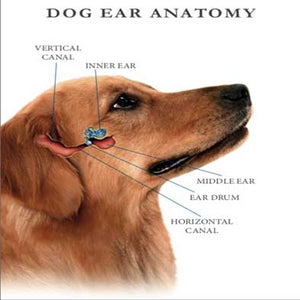Dogs are prone to ear infections because of the anatomy of their ears. They have a horizontal and a vertical component to them, so it is hard for anything in to drain out.
Signs of an ear infection include excessive head shaking, yellow to brown oozing in the ears, or a yeast-like smell. Additional signs of ear infections include redness and swelling.
There are several causes of ear infections. The most common cause of ear infections are due to allergies. Some dogs are more prone to allergies than others; therefore they get more ear infections.
If your dog does have an ear infection it is important to properly clean your dog's ears before applying any medication.
To clean your dog's ears, start by placing a few drops of an ear cleanser into the ear and massage the ear to help loosen any debris that is in there. Then use a cloth or cotton gauze to wipe the dirt out.
After your dog's ears are thoroughly clean, you can then apply your medication. Follow your veterinarian's advice about how much medication to apply to the ear, usually a few drops.
The treatment your veterinarian will prescribe will vary depending on the cause of the ear infection. For yeast infections, they might prescribe anti-fungal medication. For bacterial infections they will probably prescribe antibiotics. Normally, treatment is applied directly into the ears, but in severe cases systemic treatment may be needed. This usually means having to give your dog pills orally. .
Some breeds of dogs that are prone to ear infections include breeds with large ears that flap over the ear canal, and breeds of dogs that have a very small canal. These dogs need their ears checked often.
By knowing what to look for, you can detect ear infections early.

